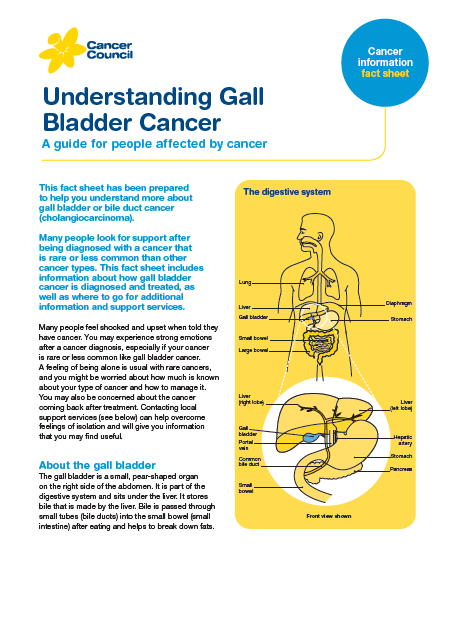- Home
- Gall bladder cancer
- Life after treatment
Life after treatment
Once your treatment has finished, you will have regular check-ups to confirm that the cancer hasn’t come back. Ongoing surveillance for gall bladder cancer involves a schedule of ongoing scans, and physical examinations. Let your doctor know immediately of any health problems between visits.
Learn more about:
- Overview
- Looking after yourself
- Practical and financial support
- Nutrition and cancer
- If the cancer comes back
Overview
Some cancer centres work with patients to develop a “survivorship care plan” which includes a summary of your treatment, sets out a schedule for follow-up care, lists any symptoms and long-term side effects to watch out for, identifies any medical or emotional problems that may develop and suggests ways to adopt a healthy lifestyle.
Maintaining a healthy body weight, eating well and being active are all important. If you don’t have a care plan ask your specialist for one and make sure a copy is given to your GP and other health care providers.
For more on this, see Living well after cancer or call Cancer Council 13 11 20.
Looking after yourself
There is no right way to feel if you have been diagnosed with a cancer such as gall bladder cancer. Feeling a range of emotions is normal and you may feel overwhelmed, anxious, fearful, angry, sad or lonely.
Many people need emotional support before, during and after treatment. Adjusting to living with visible scars, changes to your physical appearance, changes to your lifestyle and bodily function can be hard and take time. If this is affecting you, or likely to affect you, it’s important to seek help.
It can help to talk things through with a counsellor, psychologist, friend or family member. Talk to your medical team or call Cancer Council 13 11 20 about what support services are available.
For more on this, see Emotions and cancer.
Practical and financial support
There are many services that can help you manage with practical or financial issues caused by gall bladder cancer. Benefits, pensions and hardship programs may be able to help pay for prescription medicines (for example the Australian Government’s Pharmaceutical Benefits Scheme [PBS]), transport costs or utility bills. Ask the hospital social worker which services are available in your local area and if you are eligible to receive them.
For additional income, you may be able to access your superannuation early in certain circumstances, or claim on insurance policies such as income protection, trauma, and total and permanent disability (TPD).
Managing your ability to work or study, particularly during cancer treatment, is important to consider and will depend on your personal situation.
For more on this, see Cancer and your finances, Cancer, work and you or download our Insurance and cancer fact sheet.
If you need legal or financial advice, you should talk to a qualified professional about your situation. Cancer Council offers free legal and financial services in some states and territories for people who can’t afford to pay – call 13 11 20 to ask if you are eligible
Nutrition and cancer
If you have been diagnosed with gall bladder cancer, both the cancer and treatment will place extra demands on your body. Research suggests that eating well and exercising can benefit people during and after cancer treatment.
If you have had your gall bladder removed, bile made by the liver will no longer be stored between meals. Bile instead will flow directly from your liver into your small intestine and there will still be enough bile produced for normal digestion. You should still be able to eat a normal diet after your gall bladder is removed, but it’s a good idea to avoid high-fat foods for a few weeks after surgery while your body adjusts.
Eating well and being physically active can help you cope with some of the common side effects of cancer treatment, speed up recovery and improve quality of life by giving you more energy, keeping your muscles strong, helping you maintain a healthy weight and boosting your mood.
You can discuss individual nutrition and exercise plans with health professionals such as dietitians, exercise physiologists and physiotherapists.
For more on this, see our general sections on Nutrition and cancer and Exercise and cancer or watch the videos below.
If the cancer comes back
For some people gall bladder cancer does come back after treatment, which is known as a recurrence. If this happens, treatment will depend on where the cancer has returned to in your body and may include a mix of surgery, radiation therapy and chemotherapy.
In some cases of advanced cancer, treatment will focus on managing symptoms, such as pain, and improving your quality of life without trying to cure the disease. This is called palliative treatment. Palliative care treatment can be provided in the home, in a hospital, in a palliative care unit or hospice, or in a residential aged care facility.
When cancer is no longer responding to active treatment, it can be difficult to think about how and where you want to be cared for towards the end of life. But it’s essential to talk about what you want with your family and health professionals, so they know what is important to you. Your palliative care team can support you in having these conversations.
For more on this, see Palliative care, Living with advanced cancer and Facing end of life or call 13 11 20.
Video: Exercise and cancer
Video: Nutrition and cancer
More resources
Kathleen Boys, Consumer; Dr Julian Choi, HPB Surgeon, Western Health and Epworth Hospital, Vic; David Fry, Consumer; Dr Robert Gandy, Hepatobiliary Surgeon, Prince of Wales Hospital, Randwick, NSW; Yvonne King 13 11 20 Consultant, Cancer Council NSW; Elizabeth Lynch, Consumer; Dr Jenny Shannon, Medical Oncologist, Nepean Hospital Cancer Centre, NSW.
View the Cancer Council NSW editorial policy.

